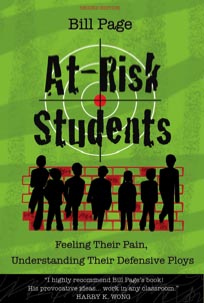|
 |
| Teachers.Net Gazette Vol.6 No.6 | June 2009 |
Subscribe for free home delivery |
|
Parents Are Recruits, Teachers Are Responsible, Kids Are Victims, and Schools Are Culpable For At-Risk Problems Troubled students cause troubled parents and vice-versa. If kids have a bad year, parents have a bad year. If parents contributed to the problem, they are not likely to resolve it. Teachers deal with at-risk kids’ problems daily. Teachers hope for help from parents but can’t expect it. The problems are theirs. | ||
| by Bill Page www.teacherteacher.com Visit: www.At-RiskStudents.com for Bill’s free monthly newsletter Continued from page 1 June 1, 2009 |
||
|
Selected Insights, Strategies and Rules to Ponder  School is a narrow structure into which all children are expected to fit. That restrictive structure is an attempt to eradicate individual differences for the convenience of teaching. Kids who do not fit the structure are forced to fit by carrot-and-stick tactics—Ritalin, group socialization, humiliation, denied privileges, and an ordinate-subordinate relationship. School then creates “special structures” for those who don’t fit the basic structure. Fortunately, in spite of school’s efforts, kids come out with their differences intact. An Insight from the Six Offered in the Chapter Insight 1: If your child is struggling in school, s/he cannot be learning. The brain cannot learn or retain nonsense, information that is confusing, or knowledge that doesn’t fit existing knowledge. Struggling with school subjects normally indicates a lack of prerequisite knowledge. Kids’ entire brain processes focus on the struggle, not on the material. Parents need to refocus the child’s effort and reduce the struggle by any means they can. Homework and current assignments do not permit time for backing up to the prerequisite material, so students are lost. Two Rules (of eight) offered for Parents Rule 1: Never support the school, the teacher or their policies. Parents must support their child. What could be worse for kids than to have every authority they know banding together against them? If ganging up on the kid helped, it might be acceptable, but additional pressure causes more resistance. Who will advocate for the kids being abused by inappropriate education? Home should be a refuge, not an extension of school domination. If kids can’t come home to a safe, accepting place, where can they go? I hope that most of the time a parent’s support of their child will be what is best for school; but don’t count on it. Schools are run for the convenience of schools. Some of what is good for schools is also good for kids. But parents should not take that for granted. If your kid makes bad decisions or violates rules at school, you can be dissatisfied with his/her choice but still show your unconditional love. Kids need to be taught, not punished. Extending school’s coercive and punitive actions into the home can lead to a downward spiral toward misbehavior and failure. Nowhere and at no time is it more important to the well-being of a child than for parents to show love, compassion, and help than when s/he is in trouble at school. Rule 8: Don’t let the school retain your child. Fight retention tooth, claw, and lawyer. Here’s why: Robert Hauser, the Chair of the National Research Council Study, recently stated: “We should know that a policy works before we try it out on a large scale. Is holding students back a grade—flunking them—good for students? The research evidence shows that it is not. Students who have been held back typically do not catch up; in fact, low-performing students learn more if they are promoted—even without remedial help—than if they are held back.” A Position Paper of the American Association of Psychologists reports: “Evidence of the psychosocial effects of grade retention is apparent in studies examining children’s perceptions of twenty stressful life events. Initial research two decades ago indicated that, by the time students were in 6th grade, they feared retention most after the loss of a parent and going blind. In 2001, 6th grade students rated grade retention as the most stressful life event, followed by the loss of a parent and going blind.” Finally, the At-Risk Dilemma And now, good news for parents: It is never too late to salvage your child’s dignity, worth, and self-confidence. Today is the first day of the rest of his/her life (of sixty or seventy years by the longevity tables). And today is the first opportunity you will ever have to begin to help him/her head in a new direction. Each successive day will be another chance to improve your relationship and show your love, value, and acceptance. You can’t begin any sooner than right now, but you can begin. Think of how happy a word, a smile, or a gesture can make him or her after fighting school all day. And think what kind of long-term response might follow such simple acts. Policy makers need to eliminate, or significantly reduce, the inappropriate and deleterious, lockstep, one-size-fits-all, grade level, punishment-based, age-grouped, fixed-schedule, tradition-laden, antiquated, negative-evaluation, mandated curriculum. So long as there is an unreasonable mismatch between the predetermined school curriculum and student preparedness, there will always be students who are unable to achieve, who are embarrassed, who struggle, who fail, and who are forced to defend their dignity, psyche, and worth instead of to learn. Unfortunately, for parents and classroom teachers and, tragically, for at-risk students, there is only one solution to the At-Risk Problem: Fit the curriculum to the learner instead of compelling the learner to fit an inappropriate curriculum. While the educational mismatch is an integral part of every school day and schooling is compulsory, parents must vigorously support their children. And teachers must find way to reduce shameful failure and find wiggle room for circumventing and defying the hurtful failure policy. I made my choice, years ago, and sought every way possible to eliminate failure and offer success within my own little closed-door corner of the world. I found that I couldn’t change the policies, the school, or the teacher next door, but I could change me. I became a student advocate, challenging the deleterious mandates and policies that caused my kids discouragement, pain, and embarrassment. You as parents can’t change the tradition-laden bureaucracy of school, but you can begin to make your concerns known at every opportunity. As you use your parental powers the effect will be cumulative and will begin to make a difference. Most of all, you can let your child know, every day in every way, that you understand. Your child needs to know and feel that “help is here and I love you unconditionally, come pass or come fail.” Schooling demands will end but your relationship lasts a lifetime. With joy in sharing, Bill Page--comments and questions are always welcome. NOTE: Click on Archives in the header of this page for Bill Page’s article, “We Get What We Get: The Bottom Line on Parent Accountability,” December 2002, for elaboration on parent and teacher responsibility.
 Bill Page is the author of the book, At-Risk Students: Feeling Their Pain, Understanding Their Defensive Ploys. “Insights and strategies for kids who can’t, don’t, or won’t learn, try, follow procedures, cooperate, or behave.” At-Risk Student: One whom teachers cannot motivate, interest, control, or teach via traditional techniques. The term “At-Risk” refers to being at risk of failure, but it has come to mean “at-certain” of not being taught. Sign up for Bill’s free monthly newsletter: www.At-RiskStudents.com The preceding article is adapted from one of the 31 chapters in, At-Risk Students. The award winning book is currently in its Second Printing and the new edition was released in 2009, 280 pages, $24.95, Educational Dynamics, Nashville, TN, Visit www.TeacherTeacher.com for information, preview, orders, and free download article. Satisfaction Guaranteed. Contact billpage@bellsouth.net for quantity discounts for Teachers’ Study Groups and free teacher study material for Faculty Focus Groups and Summer Workshops. | ||
|


 Bill Page, a farm boy, graduated from a one-room school. He forged a career in the classroom teaching middle school “troublemakers.” For the past 26 years, in addition to his classroom duties, he has taught teachers across the nation to teach the lowest achieving students successfully with his proven premise, “Failure is the choice and fault of schools, not the students.”
Bill Page, a farm boy, graduated from a one-room school. He forged a career in the classroom teaching middle school “troublemakers.” For the past 26 years, in addition to his classroom duties, he has taught teachers across the nation to teach the lowest achieving students successfully with his proven premise, “Failure is the choice and fault of schools, not the students.”